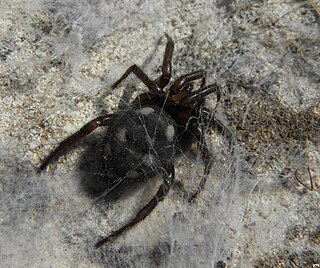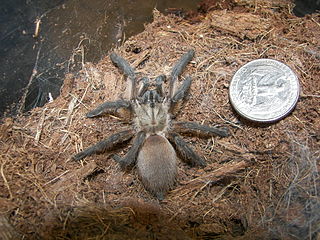
Menemerus is a genus of jumping spiders that was first described by Eugène Louis Simon in 1868. They are 4 to 10 millimetres long, flattened in shape, and very hairy, usually with brown and grayish hairs. Most species have white edges on the thorax. The abdomen is often oval, or sometimes elongated or rounded.
Schenkelia is a genus of jumping spiders that was first described by R. de Lessert in 1927.

Stenaelurillus is a genus of jumping spiders that was first described by Eugène Louis Simon in 1886. Most species live in Africa, with some species found in Asia, including China. All species have two white longitudinal stripes on the carapace, and both sexes show strong bristles around the eyes. The name is a combination of the Greek sten- "narrow" and the salticid genus Aelurillus.

Uroctea is a genus of spiders that is found in Eurasia and Africa. It is sometimes put into its own family, Urocteidae. Their tent-like web is very similar to the ones Oecobius builds; but Uroctea species do not have a cribellum.

Peucetia is a genus of lynx spiders that is found worldwide.

Smeringopus is a genus of cellar spiders that was first described by Eugène Louis Simon in 1890.

Phoneyusa is a genus of spiders belonging to the family Theraphosidae (tarantulas).
Anoploscelus is a genus of East African tarantulas that was first described by Reginald Innes Pocock in 1897. It was erected for the species Anoploscelus celeripes, based on a single male collected near Lake Tanganyika in modern day Tanzania. It was synonymized with Phoneyusa from 1985 to 1990. As of December 2019 it contains two species, including A. lesserti, first found in Rwanda in 1946.
Myostola is a spider genus in the family Theraphosidae (tarantulas), with the sole species Myostola occidentalis, found in Gabon and Cameroon.

The Eumenophorinae are a subfamily of tarantula spiders. They are known from genera distributed across Africa, southwestern countries in Saudi Arabia, and Madagascar and the associated islands.
Hybosida is a genus of East African palp-footed spiders that was first described by Eugène Louis Simon in 1898.
Procopius is a genus of African corinnid sac spiders first described by Tamerlan Thorell in 1899.
Acantharachne is a genus of African orb-weaver spiders first described by Albert Tullgren in 1910.
Drassodex is a genus of ground spiders that was first described by J. Murphy in 2007.

Euprosthenopsis is a genus of African nursery web spiders that was first described by P. Blandin in 1974.

Thomisops is a genus of spiders in the family Thomisidae. It was first described in 1879 by Karsch. As of 2017, it contains 10 species from China and Africa.
Heliophanus lesserti is a jumping spider species in the genus Heliophanus. It was first described by Wanda Wesołowska in 1986 and lives in Central and Southern Africa.
Acontius is a genus of wafer trapdoor spiders that was first described by Ferdinand Karsch in 1879.

Stenaelurillus albus is a jumping spider species in the genus Stenaelurillus that lives in India. It was first described in 2015. The spider is of medium size. The female is larger, with a body length of 6.82 mm (0.269 in), while the male is 5.89 mm (0.232 in) long. Similarly, the female has yellow bands on the cephalothorax and thorax, while on the male the bands are white. The opisthosoma in both is plain black, which distinguishes the species from others in the genus.










